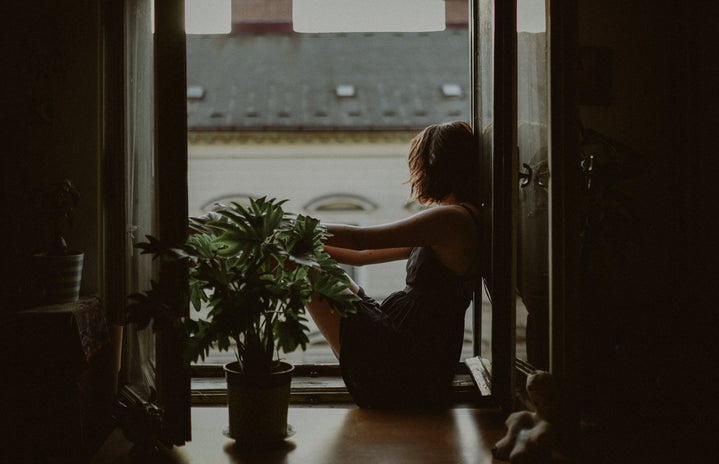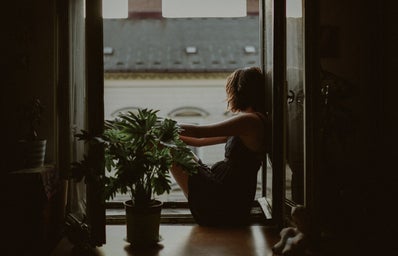“What is stronger
Than a human heartWhich shatters over and over
And still lives.”
Rupi Kaur
I grew up in Scarborough, which is typically considered a low income area. I live with my mother and father and older siblings. I am the youngest of three children and had to witness things at the age of five my brother and sister didn’t have to. They were older, after all. They could leave. And to this day, I’m still struggling with everything I witnessed as a kid.
My father is a drunk. This one time, I had to call the police on my father. A lamp was thrown and I grabbed the house phone, ran to my room, and dialled 9-1-1. My mother got mad at me when she came upstairs, “Who are you talking to? Why would you call them? You’re going to make it worse.” I suddenly knew, at the age of seven, that what goes on at home is not meant to be discussed. It’s not meant to be out in the open. You’re not supposed to talk about the darkness that lurks within the family home.
You’re taught secrecy. You’re taught to keep your head down and mouth shut, to not say anything. My mother told me if I talked, I would be taken away from her by Child Protective Services and never see my family again – but deep down, that didn’t sound half bad. At least it would get me out of that house. But she was too afraid of losing me and what could happen to her. I was a shield protecting my mother in a way. If I was not there, who knew how much worse it would get.
In my house, I heard and saw it all from my father. Death threats, threats of violence and actual violence – both directed to my mum and my siblings and I. My father called my mom every horrible name in the book – but one of the hardest things I heard happened when I was 12. My father was telling my mum that meeting her was a mistake; having kids was a mistake; he didn’t love us, or her. His biggest regret in life was having me and my siblings – we made his life miserable. It’s funny because it was him who made me miserable. Hearing this really does affect your self-worth and your self-esteem as a child. In the book, “The Body Keeps the Score: Brain, Mind, and Body in the Healing of Trauma,” Bessel Van Der Kolk says, “If your parent’s faces never lit up when they saw you, it’s hard to know what it feels like to be loved and cherished.” My parent’s faces never lit up.
My father never attended any of my school’s winter concerts I performed in, nor did my mother. He didn’t teach me how to ride a bike, drive a car, and didn’t even attend my high school graduation because he was not sober enough to be there. He didn’t ever tell me he was proud of me or showed interest in my life and my goals. He has no idea what I study in university. He is not there; he is not present like other parents might be. In fact, at the age of 17, I started working at Shoppers Drug Mart part-time after school just to avoid going home and seeing him. I would rush home after school to get my uniform and go off to work until midnight. I would wake up in the morning and do it all over again – all to avoid being home. It felt as though every time I stepped foot into that house, a dark grey cloud was looming over. It made me instantly sad, anxious and upset; there was no space for joy or love.
Because of what I have been through in my youth, I have suffered from mental health and have gone through the process of being diagnosed with mental illness, being prescribed antidepressants that have a 50 per cent chance of being effective.
It makes me wonder: If I grew up normally in a loving home with a mom and dad who cared and were present…Would I still turn out the same?
I recently took the ACE Test. The ACE Test provides you with a score, a tally of different types of abuse, neglect and other indications of a rough childhood. According to the Adverse Childhood Experiences study, the rougher your childhood, the higher your score is likely to be and the higher your risk of later health problems are.
Children who do not feel safe in infancy have trouble regulating their moods and emotional responses as they grow older. In fact, Van Der Kolk states that by kindergarten, many of these infants are either aggressive or spaced out and disengaged. They go off later in life to develop a range of psychiatric problems. They also have more physiological stress and lower immune factors.
One in six people experienced four or more types of ACE’s. If you have an ACE score of four or more, the risk of depression is three times higher. As your ACE score increases, the risk of disease, social and emotional problems arise. People with an ACE score of four or more increase the risk of emphysema or chronic bronchitis by nearly 400 per cent and suicide by 1200 per cent. An ACE score of four or more also means you are twice as likely to be a smoker and seven times more likely to be an alcoholic.
I do not want to turn out like my father.
People with higher ACE scores are more likely to be violent and more at risk of autoimmune diseases. If you have a score higher than six, your lifespan can be shortened by 20 years. The higher your score, the higher your chance of suffering from a range of psychological and medical problems like chronic depression, cancer, or coronary heart disease.
I have an ACE score of eight.
Van Der Kolk said that, “trauma is not just an event that took place sometime in the past; it is also the imprint left by that experience on mind, body, and brain. This imprint has ongoing consequences for how the human organism manages to survive in the present.” I am still battling with this imprint to this day. I will be for the rest of my life. Being traumatized means continuing to organize your life as if the trauma were still going on. But it’s not easy. I recently became diagnosed with depression, anxiety, derealization and borderline personality disorder, and it all links back to my trauma. I feel as if I am a walking time-bomb, waiting to explode; I am not connected to my body or reality. It is as if I am watching myself go about my day, but in a haze. Van Der Kolk says, “The failure to be in touch with your body contributes to the well-documented lack of self-protection and high rates of victimization and also to their remarkable difficulties feeling pleasure, sensuality, and having a sense of meaning.” It is so incredibly difficult to find meaning in anything most days, to feel anything.
It is a fear of being damaged to the core and beyond redemption.
Overcoming trauma?
“Healing, he told us, depends on experiential knowledge: You can be fully in charge of your life, only if you can acknowledge the reality of your body, in all its visceral dimension.”
Bessel Van Der Kolk
The challenge of recovery is reestablishing ownership of your body and your mind; of yourself. To me, this means feeling free to know what you know and to feel what you feel without being overwhelmed, enraged, ashamed, or collapsed.
As a kid, I was always waiting for the day my parents would apologize. To tell me they are sorry for everything they put me through. That it wasn’t my fault. That it was theirs. That they love me. But that day didn’t come. I had to stop waiting for their forgiveness, and instead, seek forgiveness within myself.
Psychotherapist Matthias James Barker describes forgiveness perfectly. “Forgiveness,” he says, “is letting go of the need for them to pay you back for what they did; letting go of the debt that they owe you. It’s coming to this place within yourself, this contentment and acceptance in yourself that says, it looks a lot like reminding them you don’t need them to be proud of me to feel okay about myself – and rather than writing the wrong themselves, I’m doing it myself.”
There is a little girl inside of me – a small version of myself who is scared helpless of her dad. A little girl who had to think of survival and survival only. A girl who did not get the privilege of being a child. I must seek forgiveness in myself for her. She needed an adult to help and guide her, to tell her it was going to be alright––and no one came. Because the ones that should have taught me to swim in a calm pool were never there, I learned to swim in a stormy ocean. Sink or swim, I managed to breathe.
I’m an adult now and I must look after my inner child. I am the one who has to teach her how to be okay again. I have to teach her how to grow because the roots she grew in were unstable and undernourished.
But she can still flourish.


